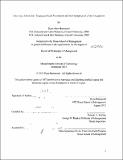| dc.contributor.advisor | Thomas A. Kochan. | en_US |
| dc.contributor.author | Hammond, Ryan Alan | en_US |
| dc.contributor.other | Sloan School of Management. | en_US |
| dc.date.accessioned | 2013-03-13T15:51:11Z | |
| dc.date.available | 2013-03-13T15:51:11Z | |
| dc.date.copyright | 2012 | en_US |
| dc.date.issued | 2012 | en_US |
| dc.identifier.uri | http://hdl.handle.net/1721.1/77821 | |
| dc.description | Thesis (Ph. D.)--Massachusetts Institute of Technology, Sloan School of Management, 2012. | en_US |
| dc.description | Cataloged from PDF version of thesis. | en_US |
| dc.description | Includes bibliographical references. | en_US |
| dc.description.abstract | Professions and occupations play a central role in shaping institutional arrangements, organizational forms, and individual organizations. I argue the emergence and development of new occupations should be among the central concerns of scholars interested in the development of new fields and market activities. To develop this argument the thesis uses the case of residential energy auditing as an emerging occupation to demonstrate how old and new forms of environmental activism have shaped key processes in the development of the occupation. The first piece of empirical work employs historical field analysis to show that three core processes of occupation formation - the creation of new practices and abstract knowledge, task bundling and shaping of favorable market demand - were directly linked to the efforts of social movement activists and organizations over a 40-year period. I conclude that social movements can provide one means by which new, institutionally weak occupations can successfully carve out a space within the division of labor. The second empirical chapter investigates the impact of recent green job activism in the geographic diffusion of voluntary worker certification in the field. Using longitudinal individual certification data, I find that specific social movement mobilization efforts did not lead directly to increased voluntary certifications in a state. However, higher rates of voluntary certification are positively associated with states containing higher levels of individual support for environmental values aligned with environmentalist frames and stronger environmental policies. In the third empirical chapter, I study whether the framing of residential energy auditing as a green job is affecting the dynamics of participation in the new occupational communities arising during the American Recovery and Reinvestment Act. I find evidence that framing the job as a green job has substantially impacted entry into the occupation and that those with stronger environmental values are participating more actively in the newly forming occupational communities in part due to an increased normative commitment to the occupation. | en_US |
| dc.description.statementofresponsibility | by Ryan Alan Hammond. | en_US |
| dc.format.extent | 215 p. | en_US |
| dc.language.iso | eng | en_US |
| dc.publisher | Massachusetts Institute of Technology | en_US |
| dc.rights | M.I.T. theses are protected by
copyright. They may be viewed from this source for any purpose, but
reproduction or distribution in any format is prohibited without written
permission. See provided URL for inquiries about permission. | en_US |
| dc.rights.uri | http://dspace.mit.edu/handle/1721.1/7582 | en_US |
| dc.subject | Sloan School of Management. | en_US |
| dc.title | Growing a green job : essays on social movements and the emergence of a new occupation | en_US |
| dc.type | Thesis | en_US |
| dc.description.degree | Ph.D. | en_US |
| dc.contributor.department | Sloan School of Management | |
| dc.identifier.oclc | 828429913 | en_US |
